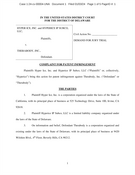-
Uniloc USA, Inc. et al v. Motorola Mobility, LLC DC
-
1:17-cv-01657 Copied
- D. Del.
- Filed: 11/15/2017
- Docket updated daily
-
-
Uniloc USA, Inc. et al v. Motorola Mobility, LLC DC
-
1:17-cv-01657 Copied
- D. Del.
- Filed: 11/15/2017
- Docket updated daily
-
